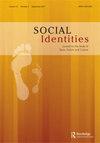身份投票
IF 0.7
Q3 ETHNIC STUDIES
引用次数: 0
摘要
过去有人说,经济和外交(后者在较小程度上)是民主国家的关键选举因素。它们仍然很重要,并可能产生决定性的影响。但其他因素也成为了中心。最近一系列引人注目的公民投票和选举都直接涉及社会身份。回想2016年的公民投票,哥伦比亚反对和平的投票——尽管投票范围很窄,而且有少数选民参与——部分原因是福音派新教对性的痴迷。因此,在这场运动中,来自种族、地理和阶级结构截然不同的男性和女性在大规模示威活动中联合起来,谴责女权主义和LGBT权利,这是一个引人注目的景象。同年,英国人投票反对英国脱欧与对帝国主义的怀念有关。在2022年的当代,极右翼在意大利的成功再次与性痴迷有关,这一次与种族痴迷交织在一起。智利对新宪法草案投反对票,除其他外,与婚姻平等和土著权利等类似关切有关。反穆斯林言论刺激了瑞典社会民主的崩溃。矛盾的是,这种趋势与以前新的、现在相当中年的社会运动的长期需求有关,尤其是那些与环境、性别和种族有关的运动。因为这些主题已经被反动的社会运动所复活,既古老又新兴。右翼活动人士从“我们”一方的直接行动理论中吸取了教训,例如他们在2021年1月6日冲击国会大厦,并声称文化/社会身份受到威胁,《伟大的替代》中写道。这些运动与父权制一神教、对民主缺乏信心、对国家的犬儒主义、深刻的民族主义、,白人至上主义(和焦虑)、对差异的厌恶、面对移民的恐惧——以及奇观的使用。60年前,汤姆·莱勒(Tom Lehrer)曾唱过左派如何在失败面前坚守文化。回顾西班牙内战和林肯旅在与弗朗西斯科·佛朗哥的法西斯主义进行的徒劳斗争,Lehrer在《Venga Jaleo》中滑稽地指出,“他可能赢得了所有的战斗”,但“我们有所有的好歌”(Lehrer,1965)。随着对文化政治和身份认同的强调,这种对奇观的强调变得更加重要,而文化政治和认同是伴随着社会进步、女权主义、民权、反全球化抗议和占领运动而来的。如今,愤怒的民粹主义右翼又开始大放异彩。它高呼口号,穿着粗鲁,蔑视权威,反对全球化和代议制政治。进步的抵抗工具被没收,并被用来对付它们的起源。由右翼主导的新的奇观政治,产生了民众对传统和崇敬的反抗,令人不安。经过几十年的斗争,文化进步人士得到了我们想要的:身份是政治和社会政治分析的中心。但不是酷儿国家和斯图尔特·霍尔。这是福音派基督教和塞缪尔·亨廷顿。为了成功应对,我们需要重新表述经济和资本政治的社会身份,在对国家的恐惧声之外,与大众阶层对话。本文章由计算机程序翻译,如有差异,请以英文原文为准。
Voting for Identity
It used to be said that economics and foreign affairs (the latter to a lesser extent) were the crucial psephological factors in democracies. They continue to matter, and can have determining effects. But other elements have become central as well. And a series of remarkable plebiscites and elections in the recent past has been contested with direct reference to social identities. Thinking back to 2016 plebiscites, the vote against peace in Colombia—albeit a narrow one, and with a minority of voters participating—was partially about evangelical Protestantism’s obsessions with sex. Hence the remarkable sight during the campaign of men and women from vastly separate racial, geographical, and class formations linking arms in large demonstrations to denounce feminism and LGBT rights. That same year, the British vote against Brexit was tied to nostalgia for imperialism. In the contemporary moment, in 2022, the success of the far right in Italy is again related to sexual obsessions, blended this time with racial ones. The vote against the new draft constitution in Chile was, inter alia, connected to similar concerns, namely marriage equality and indigenous rights. The collapse of Swedish social democracy was animated by anti-Muslim rhetoric. Such trends are paradoxically tied to longstanding demands from formerly new, now rather middle-aged, social movements, notably those linked to the environment, gender, and race. For those themes have been reanimated by reactionary social movements, both venerable and emergent. Right-wing activists have learnt from ‘our’ side’s doctrines of direct action, exemplified by their January 6, 2021 storming of the Capitol and claims about threats to cultural/social identity, per “The Great Replacement.” Such movements are closely tied to patriarchal monotheism, lack of faith in democracy, cynicism re the state, profound nationalism, doctrines of white supremacy (and anxiety), a loathing of difference, terror in the face of immigration—and the use of spectacle. Six decades ago, Tom Lehrer sang of how the left clung onto culture in the face of defeat. Looking back to the Spanish Civil War and the Lincoln Brigade’s part in what proved to be a futile struggle against Francisco Franco’s fascism, Lehrer drolly noted in troping “Venga Jaleo” that “he may have won all the battles,” but “We had all the good songs” (Lehrer, 1965). That emphasis on spectacle became even more relevant with the stress on cultural politics and identity that came with the soixante-huitards and les événements, feminism, civil rights, anti-globalization protests, and Occupy. Today, the angry populist right has picked up on spectacle. It chants, it dresses outrageously, it cocks a snook at authority, and it opposes globalization and representative politics. Progressive tools of resistance have been seized and used against their origins. The new politics of spectacle, dominated by the right, produces uncomfortable echoes of popular resistance to tradition and reverence. Cultural progressives got what we wanted after many decades of struggle: identity at the center of politics and socio-political analysis. But it wasn’t Queer Nation and Stuart Hall. It was evangelical Christianity and Samuel Huntington. To respond successfully, we need to rearticulate social identities to the economy and capital ‘p’ politics in ways that speak to the popular classes beyond the din of fear about the nation.
求助全文
通过发布文献求助,成功后即可免费获取论文全文。
去求助
来源期刊

Social Identities
ETHNIC STUDIES-
CiteScore
2.00
自引率
0.00%
发文量
22
期刊介绍:
Recent years have witnessed considerable worldwide changes concerning social identities such as race, nation and ethnicity, as well as the emergence of new forms of racism and nationalism as discriminatory exclusions. Social Identities aims to furnish an interdisciplinary and international focal point for theorizing issues at the interface of social identities. The journal is especially concerned to address these issues in the context of the transforming political economies and cultures of postmodern and postcolonial conditions. Social Identities is intended as a forum for contesting ideas and debates concerning the formations of, and transformations in, socially significant identities, their attendant forms of material exclusion and power.
 求助内容:
求助内容: 应助结果提醒方式:
应助结果提醒方式:


